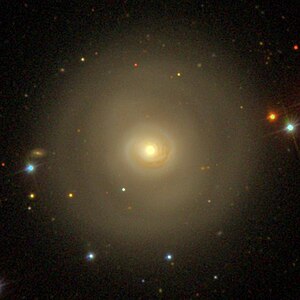NGC 2681
| Galaxy NGC 2681 |
|
|---|---|

|
|
| SDSS recording | |
| AladinLite | |
| Constellation | Big Bear |
|
Position equinox : J2000.0 , epoch : J2000.0 |
|
| Right ascension | 08 h 53 m 32.7 s |
| declination | + 51 ° 18 ′ 49 ″ |
| Appearance | |
| Morphological type | (R ') SAB (rs) 0 / a / Sy3 / LINER |
| Brightness (visual) | 10.2 mag |
| Brightness (B-band) | 11.1 mag |
| Angular expansion | 3.6 ′ × 3.3 ′ |
| Position angle | 36 ° |
| Surface brightness | 12.7 mag / arcmin² |
| Physical data | |
| Affiliation | NGC 2681 group |
| Redshift | 0.002308 +/- 0.000037 |
| Radial velocity | 692 ± 11 km / s |
|
Stroke distance v rad / H 0 |
(33 ± 2) x 10 6 ly (9.98 ± 0.72) Mpc |
| history | |
| discovery | William Herschel |
| Discovery date | March 17, 1790 |
| Catalog names | |
| NGC 2681 • UGC 4645 • PGC 24961 • CGCG 264-026 • MCG + 09-15-041 • IRAS 08500 + 5130 • KUG 0849 + 515 • 2MASX J08533273 + 5118493 • GC 1711 • H I 242 • h 530 • GALEX ASC J085332 .81 + 511850.4 | |
NGC 2681 is a lenticular galaxy with an active galaxy core of the Hubble type SB0 / a in the constellation Great Bear in the northern sky . It is estimated to be 33 million light years away from the Milky Way and has a diameter of about 35,000 ly.
In the same area of the sky are the galaxies NGC 2807 , NGC 2809 , NGC 2812 , IC 2457 .
The object was discovered on March 17, 1790 by the astronomer William Herschel with a 48 cm telescope.
Web links
Commons : NGC 2681 - collection of images, videos, and audio files
